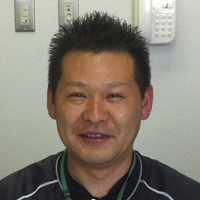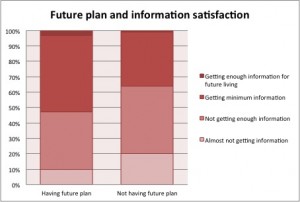
Neighborhood Skutt Ball Tournament in Touni at which the residents celebrated reunion with each other.
Metrics and Management
Additional factors contributed to the degree of success the Reconstruction Coordinators achieved– a strong emphasis on metrics is one of them. RCF has a standardized metric consisting of more than ten categories and track each area’s progress. The categories range from how well each organization represents the community as a whole, how independent and sustainable each organization is without outside support, how inclusive each organization is of women and youth’ views, and so on. They present the metrics to the local government and other supporting groups in the region on regular basis in order to measure progress towards a shared goal across organizational and sectorial boundaries.

Farewell gathering at the ground of Touni elementary school before its demolition. RCF coordinated publicity, commemorative goods and logistics for the gathering.
These examples are to be replicated in other communities within the City of Kamaishi, and RCF hopes to see wider areas beyond City and Prefectural boundaries adopt the same model as one successful example of community development.
Expansion within the City of Kamaishi
Based on the success of the nine-month RCF program in Touni, where the measurable improvement was seen in identifying the community leadership, the City of Kamaishi has decided to expand the program starting in April, hiring new Recounstruction Coordinators and re-branding the program as “Kamaishi Regional Coordinator Program” (“Kamaentai” in Japanese).
To plan the expansion of the program, the City conducted a survey of community groups, neighborhood associations and municipal service organizations to identify the areas where the Program may be most effective. The survey centered on local leadership and communication flow to determine which neighborhoods the Coordinators will be focusing on. As a result, seven Coordinators will be placed in Eastern districts and Unosumai districts beginning in April, and seven more are scheduled to be added in July.

RCF sponsored town meeting where the key members of the community organizations went over the presentation details prior to the town-wide meeting for a larger audience
Transferring and Localizing the Management Skills
According to Kazunori Ishii, of City of Kamaishi Central Reconstruction Department who is responsible for the planning survey and coordination within the City government, “Each neighborhood is unique so the expanded program will not be an exact copy of Touni.” While Touni Coordinators were placed through RCF and remained independent, Kamaentai Coordinators will be placed within local organizations which were identified to have leadership in each community. So each Coordinator serves within the specific organization and at the same time works under the same management framework the Program offers. The seven Coordinators starting in April will be supervised by the RCF Coordinators from the Touni program.
The Program will leverage the management strategies and metrics used in Touni, as well as area-wide collaboration and resource allocation within Kamaentai. The Coordinators will share the observations and issues in each neighborhood in order to find solutions as a team. The benefit of the support programs like this is the transfer of management strategies, skills and frameworks to each localities for the long run.
Voices of the Neighborhood

Kenichi Mise, the head of Touni Area Municipal Service Center and City of Kamaishi Touni Community Center
We Rely on Them for Their Advise and Wealth of Ideas
It is important to have a sounding board nearby and accessible when we are facing issues and seeking solutions. For us in Touni, RCF Coordinators were here for us to listen to our problems, suggest solutions and give us reassurances.
When we needed fresh ideas in reconstructing our community, the Coordinators provided various suggestions. When we are ready to take on a new challenge, they offered options for us to choose from– the ideas we wouldn’t necessarily think of ourselves. They offered new perspectives and their services are invaluable.
We appreciated the Events that Brought Us Together Again
After the quake, we were spread out in various temporary housings and lost the local ties we had before. Of course we wanted to visit each other and get together, but most temporary housings are up on the hills and it is not easy for us to get around. The RCF Coordinators organized area-wide sports and social events that made it possible for us to come together again.
They do a lot for us-taking care of all the logistics. When we get to see each other at these events, everyone seems so happy. To be honest, I don’t think we are ready to do the leg work ourselves, so we are really grateful that they are willing to take charge and get things done. We really depend on them.
(Translation by Fumio Ichikawa)
Tweet




